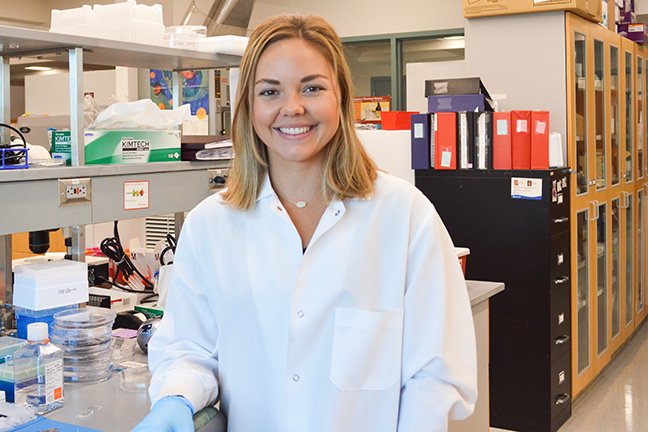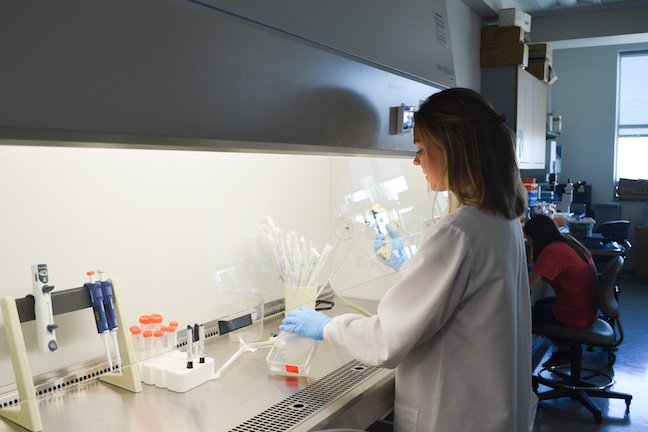Lizzy Crist: A new game plan for cancer research

CSE grad student named to SWE's list of 2019 Women Engineers You Should Know
August 20, 2019
For Lizzy Crist, failure is always constructive.
“Having a growth and learning mindset is one of the best lessons I learned from playing sports,” said Crist, a former soccer star who is now a biomedical engineering Ph.D. student in the University of Minnesota Twin Cities College of Science and Engineering. “And that failing means you’re learning, and if you’re learning, you’re growing.”
That mindset landed her on the Society of Women Engineers' 2019 list of "Women Engineers You Should Know." Before becoming a graduate student, Crist played four years of Division III soccer at Washington University in St. Louis, Mo. and was recognized as the National Collegiate Athletic Association (NCAA) Woman of the Year in 2017 for her leadership in athletics and community service.
Despite her successes, Crist’s belief in the value of failure is one of the motivating factors behind her work in biomedical engineering Professor David Wood’s Living Devices Lab.
“My research is kind of this iteration process where each time you learn something new about the experiment, you can make it better,” she said.
“If I had let the failures get me down, I think that process would have been way slower, but instead I’m still out here running experiments and continuing on.”
Kickstarting a fight against cancer
Crist studies metastasis—or the spread of cancer cells to other areas of the body—which is the phenomenon behind about 90 percent of cancer-related patient deaths. As her lab specializes in microfluidic technology, her project is to engineer a 3D model of metastasis in order to better study cancer cell migration throughout the body.
“If we can model it outside of the body, then we can experimentally tune certain factors that either promote it or inhibit it, and then we can better develop therapeutics against that,” she said.
Patient-focused research such as this is what drew Crist to the biomedical engineering field in the first place. If her lab can identify more targets for cancer therapy, Crist hopes that one day, her models can be used in clinical research.

Crist is a recipient of the CSE Three-Year Graduate Fellowship, which she credits for allowing her the freedom to pick a project with such potential for impact.
“[The fellowship] basically opened up every single door for me to walk into any professor’s office and be like, ‘Hey, I have my own funding,’” she said. “I had this sort of scientific freedom to think about a problem that I was passionate about.”
Although the implication of saving lives was a huge draw to this research, Crist also admires the collaborative nature of cancer science. While she works in tissue engineering, she collaborates with researchers in areas ranging from genetics to imaging.
“I just think of cancer as this beast of a disease that is very intelligent in the worst way,” Crist said. “There are so many groups across the country and the world who try to tackle it from so many angles, and I just want to be participating in that.”
A female-centric foundation
Crist said both her older sister and mom have been her biggest role models, which has inspired her to be a role model for younger girls, especially those who haven’t been exposed to or don’t have access to STEM education.
“Because they were so formative for me, I hopefully want to be that sort of role model for other young girls,” she said.
“Everyone should be allowed to pursue their passions, and it shouldn’t be hindered by you feeling like you’re not welcome in that space. And if you don’t see yourself [in STEM], I don’t think you’re as likely to go into it.”
In addition to volunteering through University of Minnesota outreach programs like Science for All and STEM partnerships like MnDRIVE, Crist is also vice president of Graduate Women in BME, the biomedical engineering department’s group for women in graduate programs.
Within these groups, Crist said she aims to work against the different stigma surrounding math and science, not only for women but also for other underrepresented groups.
“We’re often going into schools that may not be exposed to engineering and science as much as other schools,” she said. “It’s really important to go in there and show that engineers are real people, that they’re diverse in terms of gender and race, and that it’s a field that students shouldn’t be afraid to go into.”
This drive for teaching and encouraging diversity in STEM is what originally set Crist on her doctoral path, and she said it’s something that still motivates her today.
“One of my biggest passions is teaching students,” she said. “I realized that if I got a Ph.D. and continued in academia, I could keep making an impact on patients, specifically in cancer research, but also mentor and teach students in the classroom.”
Story by Olivia Hultgren
If you’d like to support students in the University of Minnesota College of Science and Engineering, visit our CSE Giving website.
